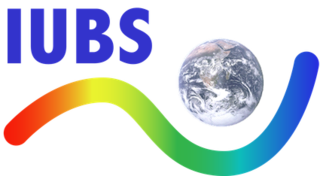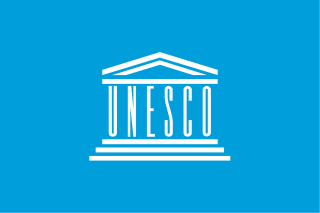AIESEC is an international "youth-run" and led, non-governmental and not-for-profit organization that provides young people with business development internships, and cheap travel experience. The organization focuses on empowering young people to make a progressive social impact. The AIESEC network includes approximately 40,000 members in 120+ countries.

The International Council on Monuments and Sites is a professional association that works for the conservation and protection of cultural heritage places around the world. Now headquartered in Charenton-le-Pont, France, ICOMOS was founded in 1965 in Warsaw as a result of the Venice Charter of 1964 and offers advice to UNESCO on World Heritage Sites.

The Ramsar Convention on Wetlands of International Importance Especially as Waterfowl Habitat is an international treaty for the conservation and sustainable use of Ramsar sites (wetlands). It is also known as the Convention on Wetlands. It is named after the city of Ramsar in Iran, where the convention was signed in 1971.

The Council for Mutual Economic Assistance was an economic organization from 1949 to 1991 under the leadership of the Soviet Union that comprised the countries of the Eastern Bloc along with a number of socialist states elsewhere in the world.
The International Epidemiological Association (IEA) is a worldwide association with more than 2000 members in over 100 different countries, who follow the aims of the association to facilitate communication amongst those engaged in research and teaching of epidemiology throughout the world, and to encourage its use in all fields of health including social, community and preventative medicine. These aims are achieved by holding scientific meetings and seminars, by publication of journals, reports, translations of books, by contact amongst members and by other activities consistent with these aims. Members are accepted without regard to race, religion, sex, political affiliation or country of origin.
The International Union for Prehistoric and Protohistoric Sciences (IUPPS) is a learned society, linked through the International Council for Philosophy and Humanistic Studies to UNESCO, and concerned with the study of prehistory and protohistory. In the words of its constitution:

The International Union of Biological Sciences (IUBS) is a non-profit organization and non-governmental organization, founded in 1919, that promotes the biological sciences internationally. As a scientific umbrella organization it was a founding member of the International Council for Science (ICSU).

The International Sociological Association (ISA) is a non-profit organization dedicated to scientific purposes in the field of sociology and social sciences. It is an international sociological body, gathering both individuals and national sociological organizations. The ISA was founded in 1949 under UNESCO and it has about 4,500 individual and 45 collective members, hailing from 167 countries. Its sole purpose is to "represent sociologists everywhere, regardless of their school of thought, scientific approaches or ideological opinion" and its objective is to "advance sociological knowledge throughout the world". Along with the Institut International de Sociologie (IIS), it is seen as a world-leading international sociological organization.

The Council for International Organizations of Medical Sciences (CIOMS) is an international non-governmental organization of 40 international, national, and associate member groups representing the biomedical science community. It was jointly established by the World Health Organization (WHO) and United Nations Educational, Scientific and Cultural Organization (UNESCO) in 1949 as a successor to the International Medical Congress that organized 17 conferences from 1867 until the 1913 outbreak of World War One.
The International Cooperative Alliance (ICA) is a non-governmental cooperative organization founded in 1895 to unite, represent and serve cooperatives worldwide. The ICA is the custodian of the internationally recognised definition, values and principles of a cooperative in the ICA Statement on the Cooperative Identity. The ICA represents 315 co-operative federation and organisations in 107 countries.
The International Social Science Council (ISSC) was an international non-governmental organization promoting the social sciences, including the economic and behavioural sciences. It was founded in Paris, France between 6 and 9 October 1952, under the auspices of UNESCO, following a Resolution at the 6th UNESCO General Conference in 1951. It was adopted on 19 September 1972, completed and revised on 14 November 1979, and underwent multiple revisions on 17 December 1985, 3 December 1992, 27 November 1998, 8 November 2006, and finally 10 December 2010. ISSC was registered in accordance with French Law.

The International Union of Forest Research Organizations (IUFRO) is a non-profit, non-governmental international network of forest scientists, headquartered in Austria. In 2019, IUFRO counted 630 Member Organizations worldwide.
Disabled Peoples' International (DPI) is a cross disability, consumer controlled international non-governmental organization (INGO) headquartered in Ottawa, Ontario, Canada, and with regional offices in Asia-Pacific, the Middle East, Europe, Africa, Latin America, and North America and the Caribbean. DPI is a network of national organizations or assemblies of disabled people, established in 1980–81 to promote the human rights of disabled people through full participation, equalization of opportunity and development. DPI assists organisations in over 152 nations with the day to day issues of helping disabled people. They also host assemblies and symposiums across the world with their different national branches.
The International Commission on Mathematical Instruction (ICMI) is a commission of the International Mathematical Union and is an internationally acting organization focussing on mathematics education. ICMI was founded in 1908 at the International Congress of Mathematicians (ICM) in Rome and aims to improve teaching standards around the world, through programs, workshops and initiatives and publications. It aims to work a great deal with developing countries, to increase teaching standards and education which can improve life quality and aid the country.
The International Publishers Association is an international publishing industry federation of national publisher associations representing book and journal publishing, founded in 1896 in Paris. It is a non-profit and non-governmental organization, to promote and protect publishing and to raise awareness for publishing in the context of economic, cultural and political development. The IPA represents the interests of the publishing industry on an international level.

The World Heritage Convention, formally the Convention Concerning the Protection of the World Cultural and Natural Heritage, is an international treaty signed on 23 November 1972, which created the World Heritage Sites, with the primary goals of nature conservation and the preservation of cultural properties. The convention, a signed document of international agreement, guides the work of the World Heritage Committee. It was developed over a seven-year period (1965–1972).
The World Science Forum (WSF) is an international conference series on global science policy. Since 2003, it is organised biannually in Budapest, Hungary.

The United Nations Educational, Scientific and Cultural Organization (UNESCO) is a specialized agency of the United Nations (UN) aimed at promoting world peace and security through international cooperation in education, arts, sciences and culture. It has 194 member states and 12 associate members, as well as partners in the non-governmental, intergovernmental and private sector. Headquartered in Paris, France, UNESCO has 53 regional field offices and 199 national commissions that facilitate its global mandate.

The World Federation of Engineering Organizations is an international, non-governmental organization representing the engineering profession worldwide.

The International Union for Pure and Applied Biophysics (IUPAB) is an international non-governmental organization whose mission is to assist in the worldwide development of biophysics, to foster international cooperation in biophysics, and to help in the application of biophysics toward solving problems of concern to all humanity. It was established in 1961 as the International Organisation for Pure and Applied Biophysics but then renamed as the International Union in 1966, when it became a member of ICSU, which itself was renamed in 2018 as ISC, the International Council for Science. Affiliated to it are the national adhering bodies of 61 countries, as well as the European Biophysical Societies' Association (EBSA), the Asian Biophysics Association and the Biophysical Society.










